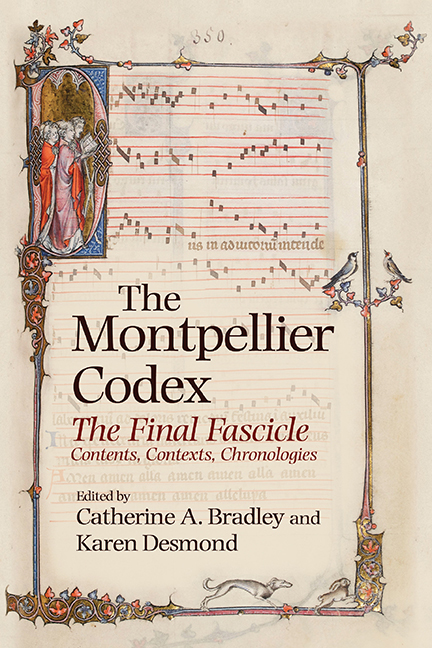Book contents
- Frontmatter
- Contents
- Figures
- Musical examples
- Tables
- Acknowledgements
- List of manuscript sigla
- Abbreviations
- Table of fascicle 8 contents
- Introduction
- I The Material Object
- II INNOVATION AND TRADITION
- III ANALYTICAL CASE STUDIES
- Bibliography
- Contributors
- General index
- Index of compositions, alphabetical
- Index of compositions in Mo, manuscript order
- Miscellaneous Endmatter
Introduction
Published online by Cambridge University Press: 04 July 2019
- Frontmatter
- Contents
- Figures
- Musical examples
- Tables
- Acknowledgements
- List of manuscript sigla
- Abbreviations
- Table of fascicle 8 contents
- Introduction
- I The Material Object
- II INNOVATION AND TRADITION
- III ANALYTICAL CASE STUDIES
- Bibliography
- Contributors
- General index
- Index of compositions, alphabetical
- Index of compositions in Mo, manuscript order
- Miscellaneous Endmatter
Summary
ONE of the most important manuscript witnesses to polyphonic music in the Middle Ages resides in the library of Montpellier's historic medical school. The so-called Montpellier codex (Bibliothèque interuniversitaire, Bibliothèque universitaire de médecine, H. 196, hereafter Mo) is modest in dimensions, but it contains the largest medieval motet collection in existence, and is packed with gorgeous gold-leaf illuminations, historiated initials, decorative borders, and exquisite music calligraphy. Unsurprisingly, this comprehensive and beautiful manuscript has long attracted scholarly attention and the details of its production are, in the main, well established and widely accepted. It seems that the earliest layer of the book – commonly referred to as Mo's ‘old corpus’ – was produced in Paris in the late 1270s or 1280s. This old corpus comprises four internal fascicles (numbers 2–6), discrete sections of the manuscript usually devoted to certain musical genres or stylistic types, with the opening of each new fascicle clearly signaled by a historiated initial. Mo's old corpus was later bookended by two additional fascicles (numbers 1 and 7), probably in the 1290s. But the last stage in Mo's compilation, and the status of its final fascicle – number 8, containing forty-three three-voice compositions – remains mysterious and contested. Most scholars agree that the forty-eight folios appended to the end of Mo must be chronologically later than the rest of the codex, but just how much later is still in question. Intriguingly, the contents of fascicle 8 straddle a crucial historiographical juncture: alongside examples of the established thirteenth-century motet tradition represented by the earlier parts of Mo, fascicle 8 features musical and notational techniques conventionally associated with newer practices. Why and at what date was fascicle 8 produced? Was it intended to be part of Mo from the outset? And how and why might this eclectic collection of different types of compositions – some perceptibly outmoded, others noticeably innovative – have come about? The essays in this volume engage with these fundamental questions, challenging and undercutting a still pervasive historiographical division between the thirteenth and fourteenth centuries in the study of medieval music.
A slight section of a single manuscript – albeit a provocative and little understood one – Mo 8 might seem an unusual subject for book-length investigation.
- Type
- Chapter
- Information
- The Montpellier CodexThe Final Fascicle. Contents, Contexts, Chronologies, pp. 1 - 10Publisher: Boydell & BrewerPrint publication year: 2018
- 1
- Cited by



